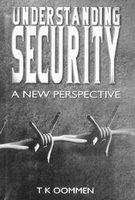Social Dimensions of Security
 UNDERSTANDING SECURITY — A New Perspective: T. K. Oommen; Macmillan India Ltd., 2/10, Ansari Road, Daryaganj, New Delhi-110002. Rs. 320.
UNDERSTANDING SECURITY — A New Perspective: T. K. Oommen; Macmillan India Ltd., 2/10, Ansari Road, Daryaganj, New Delhi-110002. Rs. 320.Addressing the recent annual meeting of the Asian Development Bank in Hyderabad, Prime Minister Manmohan Singh remarked perceptively that the aspirations of Asian nations for economic development should be accompanied by a desire to enhance levels of security in the region. Only this would provide an attractive incentive for investors looking first for a climate of political and social stability before deciding to put their money on projects. Dr. Singh was thus expanding the traditionally narrow concept of national security.
He was possibly visualising a scenario wherein nations no longer fought among themselves placing individuals and the lives of whole nations at risk, but offered levels of order and sanity conducive to creativity and uninterrupted economic activity. Dr. Singh's observation comes appropriately at a time when almost all countries in our neighbourhood are going through a distressing spell of disorder, a mark of failed governance and an ambience of low security.
Interpretation
Four years after 9/11, the Al Qaeda and Osama Bin Laden continue to dominate our thought processes, and we see visible symbols of our fear in those who guard our houses, public offices and airports. We however tend to ignore multitudes all over the globe for whom 9/11 is a mere dot in an unjust world order. They are those who do not know when and from where their next meal would come. For them, the danger from bullets or explosives is not as compelling as that from an empty stomach. Against this background, the term `security' needs a very liberal interpretation.
There are then threats to our environment about which policy makers talk eloquently but do precious little. Security from depleting levels of the ozone layer receives scant attention. It is no doubt a matter of debate whether, while talking of security, we can equate the adverse effect of pollution of air and water with the fallout from an insidious terrorist movement. Nevertheless, unquestionably we are threatened as much from the abnormal release of carbon dioxide as we are from the mindless suicide bomber.
Threats from society
The author, T. K. Oommen is a respected voice in the area of social science. When he pleads for a very comprehensive definition of `security', he is very much plausible. In his strikingly original work that examines the whole gamut of modern security studies, he convinces us that we should move away from a state-centric approach that dwelt mainly on military and nuclear threats. Rather, we would do well to evaluate the consequences of poverty, hunger and social oppression, all of which could come under one rubric: threats from society.
Those like P. Sainath, who write prodigiously and realistically on rural poverty, especially in the context of the tragically mounting numbers of farmer suicides, can write a whole volume on security as is perceived in rural India. Medha Patkar's titanic struggle is an example of a heroic demand for security that not many of us will comprehend if we stick to our traditional notions.
Security scenario
Oommen also cites the cruel hierarchy of castes that still dominates rural life, which makes life insecure to the core. Mapping the security scenario around us, the author discards the traditional division of the globe into the Third World and the rest. From a security perspective he would be happier with the categories of the New and the Old World, the former dominated by settler-majority regions, where prior to colonisation there were hardly any recognisable political-administrative units. Here, colonisation did bring in substantial security issues. Genocides and, deliberate and tendentious exercises to bring about cultural homogenisation — synonymous with `ethnic cleansing' — state-sponsored or otherwise, also make life insecure for minority groups, and we have seen enough of this both in Europe and Africa. A well-written history of how the concept of security has evolved over centuries can hardly gloss over these happenings.
`State-making and the Problematics of Security' is a brilliant chapter that dissects the complexities of South Asia in the form of secessionist movements and those either seeking rights for the `sons of the soil' or trying to eliminate artificial territorial divisions of composite cultural and linguistic communities. The localised yet strong movements in North-East India and the linguistic affinity of groups such as Bengalis and Tamils living across two or more countries have their own implications for security, although one cannot exaggerate their import for the stability of the massive nation that we are. They cannot be ignored either.
Oommen's is a bold attempt to provoke contemporary thinking on a vital subject that will continue to be debated among intellectuals as well as the unlettered. After all, is there not unanimity that we should not go back to the Hobbesian state of anarchy, but live in peace with those who may dress differently from us or speak in a tongue alien to us, if only to share the fruits of modern science and technology?
By R. K. RAGHAVAN
www.thehindu.com






0 Comments:
Post a Comment
<< Home for More Stories